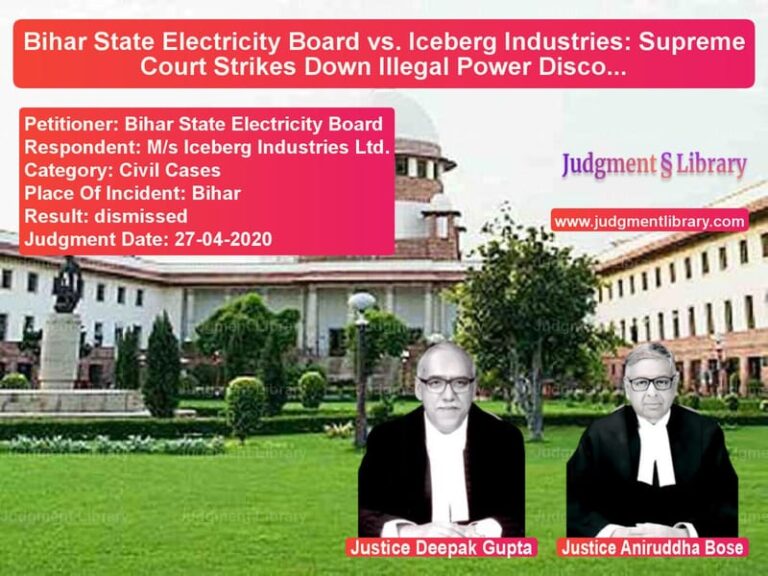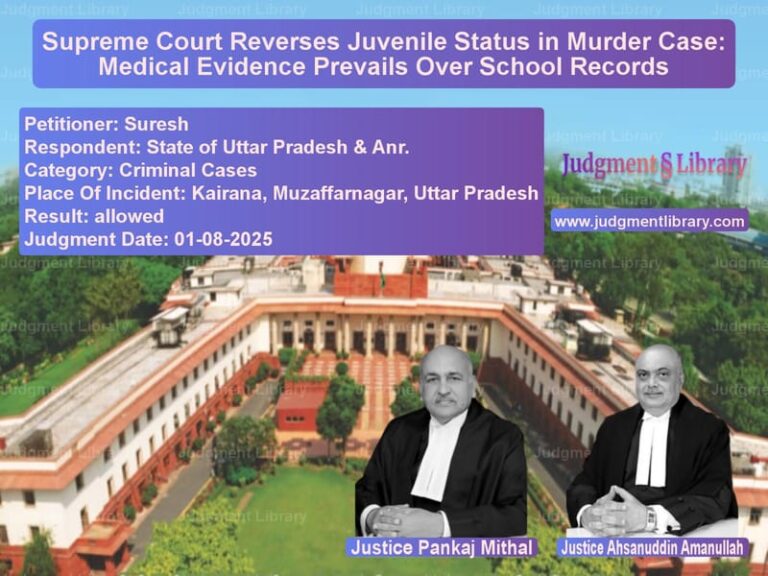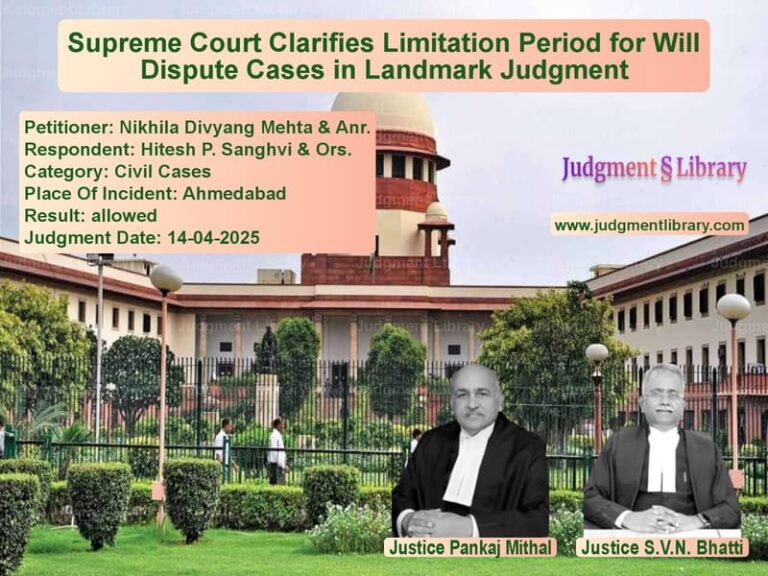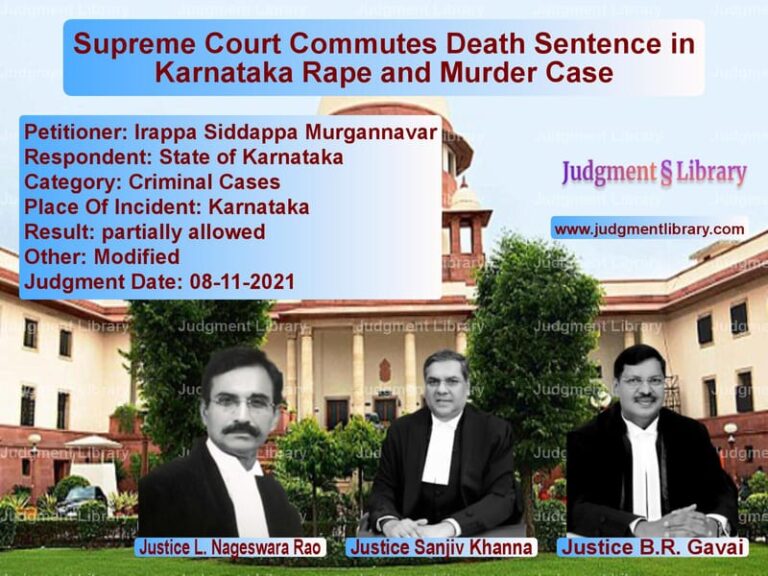Supreme Court Protects Right to Inter-Caste Marriage and Condemns Police Harassment
The Supreme Court of India recently delivered a landmark judgment in the case of Laxmibai Chandaragi B & Anr. vs. The State of Karnataka & Ors., reinforcing the right of adult individuals to marry a partner of their choice without interference from family or the state. The Court strongly condemned the role of the police in harassing the couple and emphasized the need for better training in handling such cases.
The petitioners, Laxmibai Chandaragi B and Santosh Singh Yadav, approached the Supreme Court under Article 32 of the Constitution, seeking protection from police harassment after their inter-caste marriage. The case highlights societal resistance to inter-faith and inter-caste marriages and underscores the role of law enforcement in upholding individual rights.
Background of the Case
Family Opposition and Police Involvement
On October 14, 2020, the petitioner, Ms. Laxmibai Chandaragi, left her home in Karnataka and traveled to Delhi, where she married the second petitioner, Mr. Santosh Singh Yadav. The next day, she informed her parents of the marriage via WhatsApp by sending a copy of the marriage certificate.
Her father, Mr. Basappa Chandaragi, filed a missing person complaint with the Murgod Police Station in Karnataka, leading to the registration of FIR No. 226/2020. Upon investigation, the police discovered that Ms. Chandaragi had voluntarily married and was living with her husband in Ghaziabad, Uttar Pradesh. However, instead of closing the case, the police insisted that she return to Karnataka to give a statement in person.
Harassment by Police Officials
The police attempted to pressure Ms. Chandaragi into returning to Karnataka by claiming that if she did not, they would file a kidnapping case against her husband. She sent a letter to the police stating that she had married of her own free will and feared threats from her family. Despite this, the police did not close the case.
The couple then filed a petition in the Allahabad High Court for protection. However, after a month, their case had not been heard, forcing them to approach the Supreme Court for relief.
Supreme Court’s Observations and Ruling
Condemnation of Police Conduct
The Supreme Court, comprising Sanjay Kishan Kaul and Hrishikesh Roy, expressed strong disapproval of the police’s handling of the case. The Court found that the police had overstepped their authority by insisting that Ms. Chandaragi return to Karnataka despite clear evidence that she was safe and had married voluntarily.
The judgment stated:
“If the investigating officer could visit the residence of petitioner No. 2, he could have recorded the statement of petitioner No. 1 at the place where she was residing rather than insisting and calling upon the petitioners to come to the local police station in Karnataka.”
The Court further observed that the police tactics amounted to coercion:
“The investigating officer sought to compel petitioner No.1 to come and record the statement at the police station on the threat of possibility of a false case being registered by her parents against petitioner No.2.”
Right to Marry a Person of Choice
The Supreme Court reaffirmed that the right to marry a person of one’s choice is protected under Article 21 of the Constitution of India. The judgment cited previous landmark cases, including:
- Shafin Jahan v. Asokan K.M. & Ors. (2018): The Court held that the right to marry a person of one’s choice is integral to Article 21.
- K.S. Puttaswamy v. Union of India (2017): Recognized autonomy in personal decisions, including marriage.
- Shakti Vahini v. Union of India (2018): Declared that no group, including family or community, can interfere in an adult’s choice of a marriage partner.
Call for Police Reforms
The Court directed that police officers handling such cases should undergo proper training to ensure that personal rights are respected. The judgment emphasized the need for police counseling and education on how to deal with socially sensitive matters, stating:
“The way forward for police authorities is to not only counsel the current investigating officers but devise a training program to deal with such cases for the benefit of police personnel.”
Final Judgment
- The Supreme Court quashed FIR No. 226/2020 against the couple.
- The Court directed the Karnataka police to ensure that officers are properly trained to handle inter-caste and inter-religious marriage cases.
- The Court expressed hope that Ms. Chandaragi’s parents would accept the marriage and re-establish relations with their daughter.
Key Takeaways from the Judgment
- Personal choice in marriage is protected under the Constitution.
- Police cannot harass adults who marry against family wishes.
- Threats of false cases and coercion by law enforcement are unconstitutional.
- Training programs must be implemented to educate police on handling such cases sensitively.
- Parents and society should respect individual autonomy in marriage decisions.
Impact of the Judgment
This ruling sets a strong precedent for protecting individuals in inter-caste and inter-religious marriages. It ensures that law enforcement does not become a tool for families attempting to control the personal choices of adult children.
The decision also sends a clear message that courts will not tolerate misuse of legal provisions to harass couples exercising their right to marry. The directive to train police officers on such issues is expected to bring about systemic changes in law enforcement practices.
Conclusion
The Supreme Court’s decision in Laxmibai Chandaragi B & Anr. vs. The State of Karnataka & Ors. is a crucial step toward reinforcing individual freedoms and eliminating societal prejudices. It upholds the right to love and marry freely, free from family and state interference.
The ruling is a reminder that India’s legal framework prioritizes personal liberty and equality over outdated societal norms. By quashing the police case and calling for reforms, the Supreme Court has taken a significant step toward a more inclusive and progressive society.
Petitioner Name: Laxmibai Chandaragi B & Anr..Respondent Name: The State of Karnataka & Ors..Judgment By: Justice Sanjay Kishan Kaul, Justice Hrishikesh Roy.Place Of Incident: Karnataka, India.Judgment Date: 08-02-2021.
Don’t miss out on the full details! Download the complete judgment in PDF format below and gain valuable insights instantly!
Download Judgment: laxmibai-chandaragi-vs-the-state-of-karnata-supreme-court-of-india-judgment-dated-08-02-2021.pdf
Directly Download Judgment: Directly download this Judgment
See all petitions in Fundamental Rights
See all petitions in Public Interest Litigation
See all petitions in Judgment by Sanjay Kishan Kaul
See all petitions in Judgment by Hrishikesh Roy
See all petitions in allowed
See all petitions in Quashed
See all petitions in supreme court of India judgments February 2021
See all petitions in 2021 judgments
See all posts in Constitutional Cases Category
See all allowed petitions in Constitutional Cases Category
See all Dismissed petitions in Constitutional Cases Category
See all partially allowed petitions in Constitutional Cases Category







